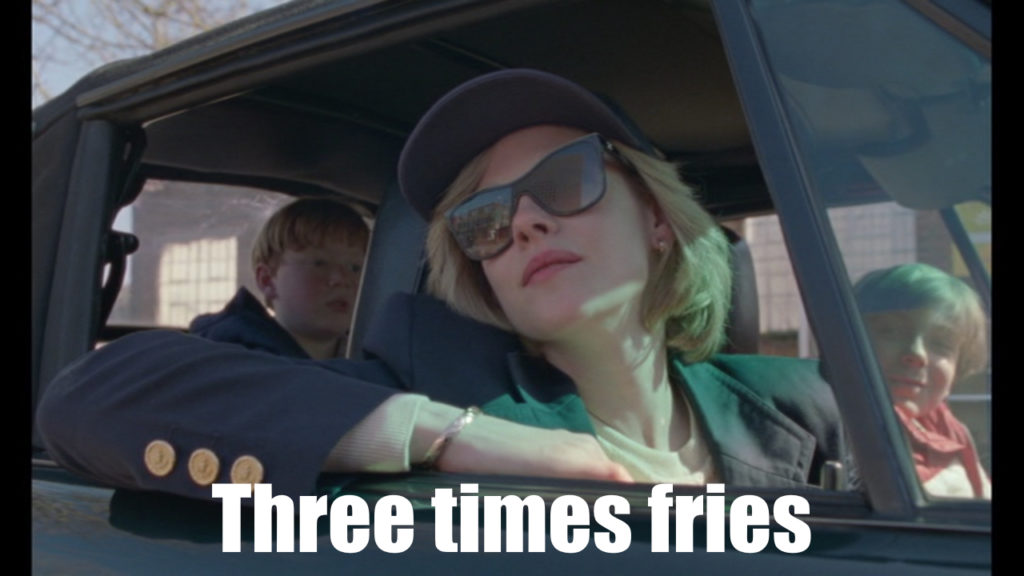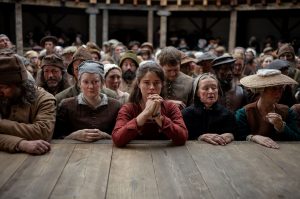Reviews include The Secret Agent, The Tale of Silyan, Cover-up.
TFCA Friday: Week of Feb. 11
February 11, 2022

Welcome to TFCA Friday, a weekly round-up of film reviews and articles by TFCA members.
2022 TFCA Emerging Critic Award!
The deadline approaches for the 2022 TFCA Emerging Critic Award! Writers in the early stages of their careers are encouraged to apply. Filing by deadline is a skill that editors admire, so get your application in before Feb. 15! Get the details here.
For an example of work by a current winner, check out Mark Hanson’s report on Canadian talent that touched down at Slamdance this year!
This Week in Movies!
https://www.youtube.com/watch?v=N-sWlgFhUGo
BigBug (dir. Jean-Pierre Jeunet)
“BigBug is more eye candy, with lots of colour and inventive gadgets of the future on display than anything else,” notes Gilbert Seah at Afro Toronto.
Blacklight (dir. Mark Williams)
“Is Liam Neeson…okay?” asks Barry Hertz at The Globe and Mail. “Much as I have enjoyed the actor’s embrace of scuzzy revenge-thrillers, he may have hit the point of diminishing returns. Put it this way: Blacklight is a movie that Bruce Willis would deem below his standards.”
“Once an action hero, always an action hero, and always with Neeson’s dignity and gravity,” counters Anne Brodie at What She Said. “Neeson’s 70 and he can still fight hard and deliver an effective verbal threat.”
“There are shootouts, and car chases, and a guy you think might be crazy but that’s just what they want you to think, and a guy you think is on the level but they just want to think that too. But don’t worry. I’ve watched the movie start to finish, and that’s all the thinking that’s going to be demanded of you,” advises Chris Knight at the National Post.”
“[B]elow-par Liam Neeson action pic with too many explanations given to the plot coupled with just mediocre action set piece,” groans Gilbert Seah at Afro Toronto.
“It passed the time.” – Norm Wilner, NOW Toronto
Compartment No. 6 (dir. Juho Kuosmanen)
“To its credit, Compartment No. 6 doesn’t go to the places where you expect it will but stands as an eccentric tough-minded and humane film featuring two beautifully calibrated performances that swing from spiky antagonism to compassion,” says Liam Lacey at Original Cin. “It’s also a film that reminds you of those pre-smart phone days, when strangers travelling together occasionally made eye contact, shared things that mattered and held on to those memories for years.”
“Compartment No. 6 works as a film due to the persuasive performances of Seidi Haarla as Laura and Yuri Borisov as Lyokha. Neither is likely to be a star even in their own countries but they’re fine in this well-judged film,” writes Marc Glassman at Classical FM.
“An amusing and excellent comic study of relationships of characters and is definitely a worthwhile watch!” exclaims Gilbert Seah at Afro Toronto.
“Director and co-writer Juho Kuosmanen came to the world’s attention in 2016 when his second feature, The Happiest Day in the Life of Olli Maki, won the Un Certain Regard prize at the Cannes film festival,” says Chris Knight at the National Post. “Compartment No. 6 played in the main part of the festival last year and won its second-place prize. Both are deeply human stories from an emerging new talent. This is a train you don’t want to miss.”
Death on the Nile (dir. Kenneth Branagh)
“Death on the Nile initially presents a cordial view of a social aristocracy void of racial conflict. Given the era and the class-conscious culture of the film’s central characters, it’s a distracting conceit, even if Branagh’s casting triumphantly opposes standards,” notes Thom Ernst at Original Cin. “Yet even with changes made to characters, it is hard to observe Death on the Nile and not notice it as a story seeped in privilege—glorified wealth-porn where the affluent traipse across monuments treating the world as their playground.”
“The cast is never under the Egyptian sun, because it’s all green screen,” writes Nathalie Atkinson at Everything Zoomer. “Exactly like the Tiffany ‘diamond’ that features in the plot: In spite of the advance marketing hype and prominent placement of a Tiffany blue box, the necklace Gadot wears in the movie is just a recreation of the famous 128.54 carat yellow diamond recently worn by Beyoncé. Just another way it’s a perfectly adequate version pretending to be something grand.”
“Shot like a television movie (or do we call these Netflix movies now?), performed with half-hearted enthusiasm by nearly everyone in the cast (with one excellent exception…) and paced with a perhaps intentionally ironic lazy-river urgency, Branagh’s film ultimately lands as a big, fat, expensive exercise in shoulder-shrugging,” shrugs Barry Hertz at The Globe and Mail.
“There are a few narrative scrapes and flubs,” admits Chris Knight at the National Post. “There’s a scene in which someone fills Poirot in on the various characters, and it feels like we’re listening to someone read the instructions from a game of Clue.”
“Death on the Nile is ultimately a movie about actors sitting around in rooms, waiting for their monologue,” yawns Norm Wilner at NOW Toronto. “The long, long road to the murder feels less like an attempt to wring every bit of drama out of Christie’s slender novel than a way to fill the expected running time of a feature film. There is no sin in bringing these things in at 105 minutes, you know. People used to do it all the time.”
https://youtu.be/L0hHFX1pU0U
The Fabulous Filipino Brothers (dir. Dante Basco)
“The dialogue is clunky at times, and the forced four-narrative format means no character is really fleshed out,” admits Jim Slotek at Original Cin. “But the movie finds its heart and its footing in the last act with Danny’s story and a redemptive finale. This is a ‘male gaze’ movie, being that it’s about four young men and a patriarchal culture, hence the lewd (and in one case dark) sexcapades that inform the story. But the women get the first and last word.”
I Want You Back (dir. Jason Orley)
“The story contains a few distractions like the friendship between Emma and a kid with advice given like: Adults pretend that they know what they are doing. Apparently the filmmakers don’t. Avoid! Avoid! Avoid this one!” cautions Gilbert Seah at Afro Toronto.
“Don’t get your hopes up for anything too crazy,” suggests Chris Knight at the National Post. “Do enjoy the Slate-and-Day show, as the two actors have some lovely chemistry and that guy/gal-next-door vibe that is more precious than Bitcoin when it comes to cinematic romances.”
“Like its characters, I Want You Back is likeable but somewhat unambitious and complacent,” admits Liam Lacey at Original Cin.” What sustains it is the easy repartee of its two leads in scenes that have the easy back-and-forth of improvisation.”
“I’ll admit that the bar is pretty low for romantic comedies at this point, but I Want You Back gives its ostensible heroes just enough brittle self-awareness to keep us guessing as to how things will ultimately play out – even as it builds to the perfect ending,” agrees Norm Wilner at NOW Toronto.
“Charlie Day and Jenny Slate serve two scoops of vanilla ice cream in I Want You Back,” says Pat Mullen at That Shelf. “This perfectly safe, reasonably enjoyable, and totally forgettable rom-com is a big lick of turn-your-brain-off escapism.”
Kimi (dir. Steven Soderbergh)
“If you enjoyed the snake-pit head games of Unsane and the classical criminal calculation of No Sudden Move (and I certainly did), then Kimi will offer some of the same pleasures, as Soderbergh – working once again as his own editor and cinematographer – situates the story in a recognizably uneasy post-pandemic world, with people masking up as needed, maintaining distance where possible and still carrying the tension of the last two years in their bodies,” writes Norm Wilner at NOW Toronto.
“Kimi gets a lot of mileage from its setup, and wisely avoids telling us too much about Angela’s condition,” writes Chris Knight at the National Post. “And it lays out the chilling notion that, even as we worry about surveillance from without – cellphone tracking, CCTVs, facial recognition in malls – many of us have let those same barbarians inside the gates.”
“Employing all the trademarks of a COVID-hobbled shoot – few actors, lots of video calls, the story largely taking place in one confined space – Soderbergh attempts to pull off a Hitchcock-lite thriller that is fast and fierce. Unfortunately, the script by David Koepp is dumb but not quite dumb enough, recycling a dozen ideas absent any self-awareness,” admits Barry Hertz at The Globe and Mail.
Marry Me (dir. Kat Coiro)
“Lopez sings up a storm with Marry Me and On My Way and dances so hard and beautifully – it’s a showcase for her powerhouse talent (and work ethic) and grit,” writes Anne Brodie at What She Said. “She is a force of nature and Wilson is gentle enough to remove the constant noise of her professional lifestyle.”
“The asinine writing and pedestrian direction do nothing to make any of this convincing,” minces Radheyan Simonpillai at NOW Toronto. “But it’s all forgettable enough that you quickly (or perhaps desperately) appreciate the bits in Marry Me that feel just a tad genuine, even if they’re also self-serving.”
“There is nothing wrong with wanting to watch two beautiful people fall in love onscreen, but you get the sense that Marry Me’s creators hold a not-insignificant disdain for, or perhaps ignorance of, the genre,” sighs Barry Hertz at The Globe and Mail. “Jokes don’t work, characters don’t evolve, and although blessed with a neat concept, there isn’t much frisson between Charlie’s humble everyday world and Kat’s high-flying extravagance.”
“Despite an overly long runtime (almost two hours) and a climax that involves a rush to, through and then out of an airport (when will films give up on this cliché?), Marry Me manages to succeed as a simple wish-fulfillment fantasy,” notes Chris Knight at the National Post. “That’s largely thanks to the charm of its costars. Wilson’s aw-shucks demeanour pairs nicely with Lopez, who makes us believe that both she and her character are just normal people who happen to sing rather well.”
Parallel Mothers (dir. Pedro Almodóvar)
*TFCA Award nominee: Best Actress – Penélope Cruz*
“There’s an unselfconscious sensuality to [Almodóvar’s] films, with his famous colour palate, and love of the colour red. There is a scene in the film where Janis teaches Ana how to make a potato frittata that is so visceral that after watching the film, I made the same meal for dinner,” writes Karen Gordon at Original Cin. “Almodóvar’s magic is once again fully evident.”
“Parallel Mothers is a deeply moving film,” says Marc Glassman at Classical FM. “It’s a melodrama, which works on personal and political levels. Almodóvar has created a profound film, with true emotional depth. Cruz is terrific in the film as is the newcomer Milena Smit. When people talk about the difference between art films and escapist fare, they’re talking about works like this.”
“Almodóvar lowers the visual and emotional temperature this time, out of respect for the dark history permeating the story, the mass murder of locals by Fascists under dictator Francisco Franco and the thread of lost babies,” observes Anne Brodie at What She Said. “Gut-wrenchingly emotional in its stripped-down way, a masterpiece of subtlety from a director not known for it, the evolution of a mature master filmmaker.”
“Cruz gives the performance of her career, holding the screen with the tiniest shift of her gaze,” raves Norm Wilner at NOW Toronto. “Almodóvar understands her better than any other filmmaker, always finding something new and striking for her; he also introduces the riveting Smit as her co-star, and gives her an arc that’s just as charged.”
“There are a lot of moving parts in Parallel Mothers, but the writer/director keeps things moving briskly and clearly through the film’s two hours,” adds Chris Knight at the National Post. “And credit must surely go to editor Teresa Font, who also worked on Almodóvar’s last film, the Oscar-nominated Pain and Glory. There’s one marvelously timed flashback that is worth the price of admission all on its own.”
“Parallel Mothers is Almodóvar at his best with Cruz delivering a top notch performance,” notes Gilbert Seah at Afro Toronto.
“Cruz, whose presence here marks her seventh time working with Almodóvar, goes beyond typical excellence,” raves Barry Hertz at The Globe and Mail. “As Janis confronts traumas both contemporary and historical, the actress must portray both victim and crusader, all without falling to pieces. It is a remarkable performance that should live in the hall of Almodóvar’s many great women on the verge of a nervous breakdown.”
“Penélope Cruz is to Pedro Almodóvar what a bulbous glass of pinot noir is to a fragrant hunk of truffle cheese,” notes Pat Mullen at That Shelf. “The actor and director complement each other’s flavours perfectly. Parallel Mothers is further proof that they’re among the best actor-director film combos of this or any generation.”
The Privilege (dir. Felix Fuchssteiner and Katharina Schöde)
“[S]tylish German kitsch but it is so well put together, especially in its details, that the film emerges an absorbing watch, particularly among teens, despite its predictability and credibility flaws,” says Gilbert Seah at Afro Toronto.
The Sky Is Everywhere (dir. Josephine Decker)
“A nice exploration of those confusing years when something bad happens, and how a young person might survive and thrive great loss with family, community and nature,” notes Anne Brodie at What She Said.
Those Who Walk Away (dir. Robert Rippberger)
“The film offers the occasional neat camera work in a horror setting but not much else in terms of material or scares,” Afro Toronto.
The Worst Person in the World (dir. Joachim Trier)
*TFCA Award nominee: Best International Feature*
“Reinsve won the best actress prize at Cannes for her sympathetic and natural performance, and I wouldn’t be surprised to see her working with big-name Hollywood directors in the near future,” writes Chris Knight in a ***** review at the National Post. “But her first screen role was a bit part in Trier’s 2011 film Oslo, August 31st. He saw something in her then. Now the rest of us can too.”
“[An] anti-romantic drama that would make a good alternative to a date night at the movies,” suggests Gilbert Seah at Afro Toronto.
“Reinsve’s performance has been rightly recognized. But she’s well matched in the film – in particular by the actors who play the two men she’s involved with in the film,” notes Karen Gordon at Original Cin. “The film’s soul, however, comes from Anders Danielsen Lie, who plays Aksel. His relationship with Julie, with the world and with himself, grounds the film. Like Reinsve, he’s an internal actor, and you can see what the character is thinking in his subtle reactions.”
“Fabulously inventive, fresh and fun, especially as we aren’t sure about the protagonist. Special kudos to Reinsve for her stellar performance,” cheers Anne Brodie at What She Said.
“A truly millennial anti-rom-com about the frustrations of growing older and the rewards of breaking free from conventional paths,” writes Pat Mullen at That Shelf. “Anchored by an effervescent Renate Reinsve, this contemporary coming-of-age story is something to savour.”
“Reinsve’s wide-open performance ensures we remain sympathetic to Julie, even as she makes choices that disappoint or even injure the people around her; she’s not malicious or selfish, just ignorant of how others should be able to rely on her as much as she relies on them,” says Norm Wilner at NOW Toronto.

Oscars: Who’s In? Who’s Out?
At The Globe and Mail, Barry Hertz explains how the Academy inadvertently declared war on Canada: “Canadian director Denis Villeneuve’s sci-fi epic scored 10 nods, including best picture. The bad news: Villeneuve himself went unrecognized in the best director category, which is a head-scratcher that would confound even the most devoted member of the Bene Gesserit,” writes Hertz. “Say what you will about the film’s is-that-it??? climax, but it took a director of true, determined, madcap vision to bring Frank Herbert’s universe to the screen in a way that felt not only comprehensible but genuinely thrilling.”
One Canadian who could bring home Oscar gold for Dune, however, is make-up artist Donald Mowat. At Everything Zoomer, Nathalie Atkinson chats with Mowat about working with Villeneuve on the sci-fi epic. “With Denis, I think we’re maybe just meant to be together. His eye, the way he thinks, he challenges you,” says Mowat. “It’s so funny after all these years, here we are two people from the same province albeit very different, working together. For me, creatively he trusts me, and I know what he’ll like and won’t like, and can present things to him.”
“Kristen Stewart fans can roll up to the KFC in celebration, for her Oscar bid for Spencer is back on track after missing out at both the Screen Actors Guild and the BAFTA nominations,” cheers Pat Mullen at That Shelf. “The latter really threw Oscar watchers for a loop when the British Academy’s wonky nomination system (members vote on two acing contenders from a long list, while a secret committee picks four) shut out all the perceived frontrunners in the Best Actress race save for Lady Gaga, who missed the cut with Oscar for her campy turn in House of Gucci… Stewart fans can hold out hope. Regina King previously won the Oscar (for If Beale Street Could Talk) after missing the cut with both SAG and BAFTA–and that was when BAFTA’s nomination process mirrored the Academy’s.”
At NOW Toronto, meanwhile, Norm Wilner has reasons to jeer and cheer the Best Supporting Actor line-up: “Paul Thomas Anderson’s Licorice Pizza landed major nominations for picture, director and original screenplay… but no love anywhere else. Bradley Cooper, who plays a frenzied version of Hollywood producer Jon Peters, was as much of a lock as anyone for a supporting actor nomination, but that didn’t happen; on the upside, Jared Leto wasn’t nominated for his feature-length hate crime in House of Gucci, either.”
And Canada’s Oscar equivalent, the Canadian Screen Awards, will be staying virtual this year. “This year’s Canadian Screen Week, which culminates with the marquee CSA gala, will also take place in an entirely virtual format,” reports Barry Hertz at The Globe and Mail. “Nine separate shows, featuring a host filmed live in a closed studio setting, will be live-streamed from April 4 through April 8 via the Canadian Academy’s social-media channels. Winners will use virtual meeting platforms to deliver acceptance speeches from their homes.”
https://www.youtube.com/watch?v=WQCQgth8baA
TV Talk
At What She Said, Anne Brodie finds big rewards with Best in Miniature. “The contestants are devoted to their art. Miniaturism is a fascinating culture and the show brings it out into the open.”
At NOW Toronto, Norm Wilner has a good time with the Gugu Mbatha-Raw mini-series The Girl Before. “[P]art of the fun of The Girl Before is its willingness to throw every possibility at us – is there a supernatural angle, with Emma literally haunting Jane?” writes Wilner. “Could the house’s environmental tech be weeding out people it doesn’t like? – and the way the actors all commit fully to their volatile, spiralling characters.”



